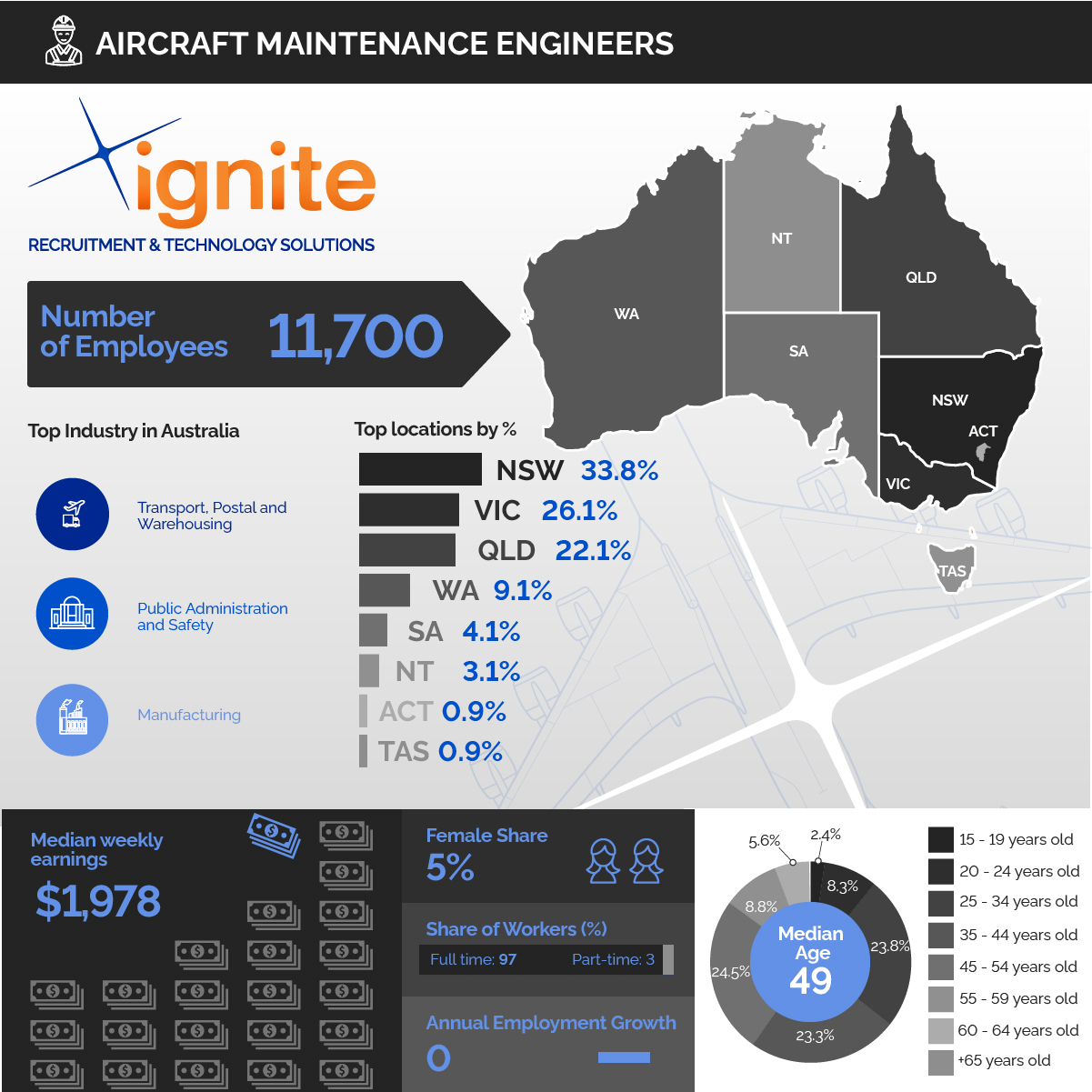
As Australia’s aviation industry grows, so does the demand for skilled Aircraft Maintenance Engineers (AMEs). These professionals play a crucial role in ensuring safety and efficiency within the nation’s aviation infrastructure. If you’re considering a career in this field or hiring an Aircraft Maintenance Engineer, understanding the demographics, industry alignment, and earning potential can offer valuable insight into this specialized occupation.
For those interested in learning more about related engineering roles, Ignite’s engineering recruitment services provide in-depth expertise and support for candidates and employers alike.
Snapshot of the Aircraft Maintenance Engineer Workforce
Australia’s Aircraft Maintenance Engineer workforce currently stands at around 11,700 professionals. With a median age of 49, this sector is populated by seasoned experts, a testament to the experience and technical knowledge required. The role demands precision and in-depth technical understanding, often acquired over decades of hands-on experience.
| Metric | Details |
|---|---|
| Number of Employees | 11,700 |
| Median Age | 49 years |
| Median Weekly Earning | $1,978 |
| Full-Time Employment Rate | 97% |
| Annual Employment Growth | 0% |
| Female Representation | 5% |
Age Demographics of Aircraft Maintenance Engineers
The workforce for Aircraft Maintenance Engineers in Australia includes a mix of experience levels, with the most substantial representation found in the 45-54 age bracket.
| Age Group | Percentage of Workforce (%) |
|---|---|
| 15 – 19 | 2.4% |
| 20 – 24 | 8.3% |
| 25 – 34 | 23.8% |
| 35 – 44 | 23.3% |
| 45 – 54 | 24.5% |
| 55 – 59 | 8.8% |
| 60 – 64 | 5.6% |
| 65+ | 3.3% |
This distribution shows a large portion of AMEs are in their prime working years, between 35 and 54, but there are emerging younger professionals, particularly in the 25-34 age group, who are entering this critical field.
Earning Potential and Employment Type
Aircraft Maintenance Engineers in Australia enjoy high earning potential, with a median weekly income of $1,978. This income reflects both the technical complexity of their work and the extensive training typically required. The industry also shows a strong preference for full-time employment, with 97% of AMEs working full-time hours, emphasizing the sector’s reliance on a stable, dedicated workforce.
Top Industries Employing Aircraft Maintenance Engineers
Aircraft Maintenance Engineers are predominantly employed within these sectors, reflecting the critical nature of their roles in supporting Australia’s aviation infrastructure:
| Industry | Primary Sectors |
|---|---|
| Transport, Postal, and Warehousing | Airline operations, freight transport |
| Manufacturing | Aircraft manufacturing and maintenance |
| Public Administration and Safety | Government roles focusing on safety compliance |
Gender Representation in Aircraft Maintenance Engineering
Currently, only 5% of Aircraft Maintenance Engineers in Australia are female. This low percentage indicates a significant gender gap, highlighting an opportunity for greater diversity within the industry. With various programs encouraging more women to consider careers in this field, there are pathways to balance gender representation in the future.
Geographical Distribution of Aircraft Maintenance Engineers
Aircraft Maintenance Engineers are distributed across Australia, with higher concentrations in states with major airports and aviation hubs.
| State/Territory | Percentage of Workforce (%) |
|---|---|
| New South Wales (NSW) | 33.8% |
| Victoria (VIC) | 26.1% |
| Queensland (QLD) | 22.1% |
| South Australia (SA) | 4.1% |
| Western Australia (WA) | 9.1% |
| Tasmania (TAS) | 0.9% |
| Northern Territory (NT) | 3.1% |
| Australian Capital Territory (ACT) | 0.9% |
This distribution suggests that NSW, VIC, and QLD, which host some of the country’s major airports, have the highest demand for these professionals.
Employment Growth and Industry Stability
While annual employment growth in Aircraft Maintenance Engineering currently stands at 0%, this stability can be a positive indicator of consistent demand within the aviation and related sectors. Given the critical need for maintenance and safety, demand for AMEs is expected to remain steady, even as new technologies and training continue to evolve the profession.
Conclusion
Aircraft Maintenance Engineers play a vital role in Australia’s aviation sector, from ensuring passenger safety to maintaining complex machinery. With substantial earning potential, a predominantly full-time workforce, and strategic employment within transport and manufacturing, the role offers stability and career longevity. As the industry evolves, there may also be opportunities to encourage greater gender diversity and attract younger talent to this essential profession.
For more information on engineering career opportunities, visit Ignite’s engineering recruitment page to explore services tailored to the aviation and maintenance sectors.


Leave a Comment
We’d love to hear from you! Share your thoughts or ask a question in the form below.